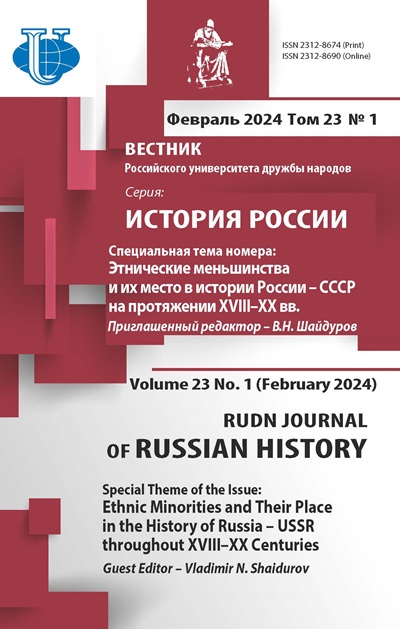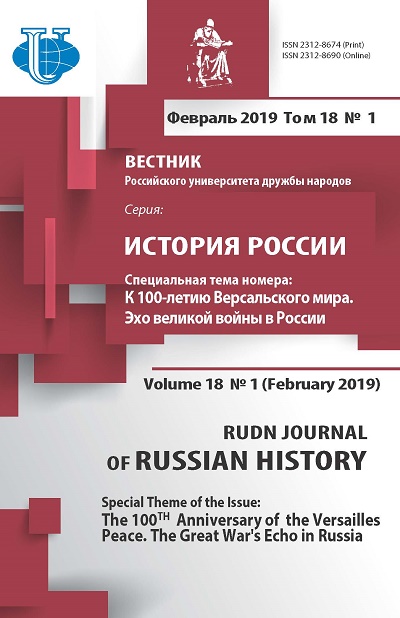Russian Military Construction Against the Background of Militarization of her Allies and Opponents, and its Trial by War
- Authors: Volkova I.V1
-
Affiliations:
- National Research University “Higher School of Economics”
- Issue: Vol 18, No 1 (2019): THE 100TH ANNIVERSARY OF THE VERSAILLES PEACE. THE GREAT WAR’S ECHO IN RUSSIA
- Pages: 11-30
- Section: THE 100TH ANNIVERSARY OF THE VERSAILLES PEACE. THE GREAT WAR’S ECHO IN RUSSIA
- URL: https://journals.rudn.ru/russian-history/article/view/20638
- DOI: https://doi.org/10.22363/2312-8674-2019-18-1-11-30
Cite item
Full text / tables, figures
Abstract
The author analyses Russian military reforms of the late 19th and early 20thcenturies and their influence on the efficiency of the army and the behavior of the lower ranks in military action. Strategic failures of the national army in the early twentieth century are explained by the fact that even in the modernized armed forces military service was not the same for all groups of citizens. These aspects of the Russian experience are compared to military reforms among the Great War’s other belligerents. The notion of the military as ‘the armed nation’ came in two variants. In Great Britain, the 1916 law on universal conscription and the effective mobilization of the civilian population became possible due to the high levels of public support for the political system, the proclaimed values of their country, and a national-civil identity. The German model, by contrast, was built on the foundation not of political integration but of the nation’s identification with its army. Russia chose this model but was unable consistently to implement it, primarily because of the extremely low literacy rate among the lower social classes. The low quality of recruits made it necessary to maintain long periods of service for most of the lower ranks. This resulted in a lack of loyalty on the side of the conscripts, and in a negative attitude not only towards military service but also towards the state that established the heavy standards of military duty. The feeling of social injustice was reinforced by the spartan regime that lower class soldiers encountered, while well-educated conscripts - as a rule, from the upper strata of Russian society - were treated better. This discontent increased during the unsuccessful war, further alienating the mass of the conscripts from autocracy and its army.
About the authors
Irina V Volkova
National Research University “Higher School of Economics”
Author for correspondence.
Email: wolkowa-irina@yandex.ru
-
21/4, p. 3, Old Basmannaya St., Moscow, 105066, RussiaReferences
- Astashov, A.B. “Russkiy krest’yanin na frontakh Pervoy mirovoy voyny.” [Russian peasant on the fronts of the First World War] Otechestvennaya istoriya, no. 2 (2003): 72−86 (in Russian).
- Astashov, A.B. “Russkiye soldaty i Pervaya mirovaya voyna. Psikhoistoricheskoye issledovaniye voyennogo opyta.” [Russian soldiers and the First World War. Psycho-historical study of military experience] In Sotsial’naya istoriya. Yezhegodnik, 2001/2002. Moscow: ROSSPEN Publ., 2004 (in Russian).
- Bayrau, D. “Imperiya i eye armiya.” [Empire and its army] Novyy chasovoy, no. 3 (1997): 19−39 (in Russian).
- Bazanov, S.N. “K istorii razvala russkoy armii v 1917 godu.” [To the history of the collapse of the Russian army in 1917] In Armiya i obshchestvo. 1900–1941. Stat’i, dokumenty. Moscow: IRI RAN Publ., 1999 (in Russian).
- Beskrovnyy, L.G. Russkaya armiya i fl ot v XX veke [Russian army and navy in the twentieth century]. Moscow: Nauka Publ., 1972 (in Russian).
- Beskrovnyy, L.G. Armiya i fl ot Rossii v nachale XX v. Ocherki voyenno- ekonomicheskogo potentsiala [The army and navy of Russia in the early twentieth century. Sketches of militaryeconomic potential]. Moscow: Nauka Publ., 1986 (in Russian).
- Bogdanovich, A.V. Dnevnik. Tri poslednikh samoderzhtsa [A diary. The last three autocrat]. Moscow; Leningrad.: L.D. Frenkel’ Publ., 1924 (in Russian).
- Chimarov, S.Y. Russkaya pravoslavnaya tserkov’ i vooruzhennyye sily Rossii v 1800–1917 gg [Russian Orthodox Church and the Armed Forces of Russia in 1800–1917]. St. Petersburg: Nestor Publ., 1999 (in Russain).
- Danilov, Y.N. Na puti k krusheniyu. Ocherki poslednego perioda Rossiyskoy monarkhii [On the way to crash. Essays on the last period of the Russian monarchy]. Moscow: XXI vek-soglasiye Publ., 2000 (in Russian).
- Denikin, A.I. Put’ russkogo ofi tsera [The path of the Russian offi cer]. Moscow: Sovremennik Publ., 1990 (in Russian).
- Fadeyev, D.I. “Ukloneniye ot voinskoy sluzhby v gody Pervoy mirovoy voyny (1914 – fevral’ 1917gg.) v Kazanskoy i Simbirskoy guberniyakh.” [Evasion of military service during the First World War (1914–February 1917) in the Kazan and Simbirsk provinces] Molodoy uchenyy, no. 19 (2015): 667−670 (in Russian).
- Fischer, F. Griff nach der Welt Macht. Die Kriegspolitik des Keiserlichen Deutchland. 1914/1918. [N.p.]: Athenaum Verlag, 1979 (in German).
- Fuller, W.C. Civil-Military Confl ict in Imperial Russia. 1881–1914. [N.p.]: Princeton University Press, 1985.
- Gooch, J. Armies in Europe. London: Routledge & Kegan Pau, 1980.
- Gooch, J. Army, State and Society in Italy. 1870–1915. Hampshire; London: [S.n.], 1989.
- Gosudarstvennaya oborona Rossii. Imperativy russkoy voyennoy klassiki [State defense of Russia. Imperatives of Russian military classics]. Moscow: Russkiy put’ Publ., 2002 (in Russian).
- Hale, W. Turkish Politics and Military. London: New York: Routledge, 1994.
- Ignat’yev, A.A. 50 let v stroyu [50 years in the ranks]. Vol. 1. Moscow: Voyenizdat Publ., 1989 (in Russian).
- Ivanov, A.I. Vooruzhennyye sily Yaponii: istoriya i sovremennost’. K 40-leniyu razgroma Yaponii vo Vtoroy mirovoy voyne [The armed forces of Japan: history and modernity. By the 40th, the defeat of Japan in World War II]. Moscow: Nauka Publ., 1985 (in Russian).
- Kennedy, P. The Rise and Fall of Great Powers. London: Unwin Hyman Limited, 1988.
- Khmelevskaya, Y.Y. “ ‘Bol’shaya igra’? Rol’ sportivnoy etiki v podderzhanii moral’nogo dukha britanskoy armii v pervoy mirovoy voyne.” [‘Big game’? The role of sports ethics in maintaining the morale of the British army in World War I] In Chelovek i voyna. Voyna kak yavleniye kul’tury. Moscow: Airo-XX Publ., 2001 (in Russian).
- Kultyshov, P.G. Russkaya armiya v Pervoy mirovoy voyne. Istoriko-antropologicheskiy aspect [Russian army in the First World War. Historical and anthropological aspect]. Rostov on Don: [S.n.], 2010 (in Russian).
- Kuropatkin, A.N. Russko-yaponskaya voyna, 1904–1905. Itogi voyny [Russian-Japanese War, 1904–1905. The outcome of the war]. St. Petersburg: Poligon Publ., 2002 (in Russian).
- Lapin, V.V. “The Army of Empire – Empire in the Army: The Structure and Recruitment of the Russian Armed Forces in the 16th – 20th centuries.” Ab Imperio. Teoriya i istoriya natsional’nostey i natsionalizma v postsovetskom prostranstve, no. 4 (2002): 109−140 (in Russian).
- Lenin, V.I. Polnoye sobraniye sochineniy [Full composition of writings]. Vol. 4. Moscow: Politicheskaya literature Publ., 1967 (in Russian).
- Lobov, V.N. O dolge i chesti voinskoy v rossiyskoy armii. Sbornik materialov, dokumentov i statey [About the duty and honor of the military in the Russian army. Collection of materials, documents and articles]. Moscow: Voyenizdat Publ., 1990 (in Russian).
- Lyudendorf, E. Moi vospominaniya o voyne 1914–1918 gg [My memories of the war of 1914–1918]. Vol. 1. Moscow: Veche Publ., 2014 (in Russian).
- Mannergeym, K.G. Memuary [Memoirs]. Moscow: Vagrius Publ., 1999 (in Russian).
- Menning, B.U. Pulya i shtyk. Armiya rossiyskoy imperii.1861–1914 [Bullet and bayonet. Army of the Russian Empire. 1861–1914]. Moscow: Modest Kolerov Publ., 2016 (in Russian).
- Novikova, I.N. “Separatizm kak gosudarstvennaya politika: rol’ nemetskoy diplomatii v sozdanii ‘Ligi inorodtsev Rossii’ v gody Pervoy mirovoy voyny.” [Separatism as a state policy: the role of German diplomacy in the creation of the ‘League of Russian Aliens’ during the First World War] In Rossiya v voynakh XX veka. Materialy 7-oy Vserossiyskoy nauchno-prakticheskoy konferentsii ‘Rossiyskoye obshchestvo i voyny XX veka’. Krasnodar: [S.n.], 2004 (in Russian).
- Os’kin, M.V. “Rossiyskiye dezertiry Pervoy mirovoy voyny.” [Russian deserters of the First World War] Vestnik Pravoslavnogo Svyato-Tikhonovskogo universiteta. Seriya Istoriya, no. 5 (2014): 46−60 (in Russian).
- Polikarpov, V.V. Voyennaya kontrrevolyutsiya v Rossii. 1905–1917 gg [Military counterrevolution in Russia. 1905–1917]. Moscow: Nauka Publ., 1990 (in Russian).
- Polnyy svod zakonov Rossiyskoy imperii [Full set of laws of the Russian Empire]. Vol. 32, no. 37417 (in Russian).
- Porshneva, O.S. Krest’yane, rabochiye i soldaty Rossii nakanune m v gody Pervoy mirovoy voyny [Peasants, workers and soldiers of Russia on the eve of the m during the First World War]. Moscow: ROSSPEN Publ., 2004 (in Russian).
- Rediger, A. Istoriya moyey zhizni. Vospominaniya voyennogo ministra [Story of my life. Memories of the Minister of War]. Vol. 1. Moscow: Kanon-press Publ.; Kuchkovo pole Publ., 1999 (in Russian).
- Repnikov, A.V., Rudaya, Y.N., and A.A. Ivanov. Svet i teni Velikoy voyny [Light and shadows of the Great War]. Moscow: ROSSPEN Publ., 2014 (in Russian).
- Rossiya i SSSR v voynakh XX veka. Statisticheskoye issledovaniye [Russia and the USSR in the wars of the twentieth century. Statistical study]. Moscow: Olma-Press Publ., 2001 (in Russian).
- Selishchev, A.S. Yaponskaya ekspansiya: lyudi i idei [Japanese expansion: people and ideas]. Irkutsk: Irkutsk University Publ., 1993 (in Russian).
- Senyavskaya, Y.S. Chelovek na voyne. Istoriko-psikhologicheskiye ocherki [The man in the war. Historical and psychological essays]. Moscow: IRI RAN Publ., 1997 (in Russian).
- Senyavskaya, Y.S. Psikhologiya voyny v XX veke: istoricheskiy opyt Rossii [Psychology of war in the twentieth century: Russia’s historical experience]. Moscow: ROSSPEN Publ., 1999 (in Russian).
- Senyavskaya, Y.S. Senyavskiy, A.S., and L.V. Zhukova. Chelovek i frontovaya povsednevnost’ v voynakh Rossii XX veka: ocherki po voyennoy istorii [Man and frontline everyday life in the wars of Russia of the twentieth century: essays on the military history]. Moscow; St. Petersburg: IRI RAN Publ., 2017 (in Russian).
- Senyavskiy, A.S, and Senyavskaya,Y.S. “Historic Memory of the XXth Century Wars as the Sphere of Ideological, Political, and Psychological Confrontation.” Otechestvennaya istoriya (The Ending), no. 2 (2007): 139−151 (in Russian).
- Senyavskiy, A.S, and Senyavskaya,Y.S. “Historic Memory of the XXth Century Wars as the Sphere of Ideological, Political, and Psychological Confrontation.” Otechestvennaya istoriya, no. 2, 3 (2007): 107−121 (in Russian).
- Sergeyev, Ye.Yu. Pervaya mirovaya voyna – prolog XX veka. Materialy mezhdunarodnoy nauchnoy konferentsii [World War I − the prologue of the twentieth century. Materials of the international scientifi c conference]. Moscow: IVI RAN Publ., 2015 (in Russian).
- Svechin, A.A. Evolyutsiya voyennogo iskusstva [The evolution of military art]. Vol. 2. Moscow; Leningrad: Voyengiz Publ., 1928 (in Russian).
- Telitsyn, V.L. “Russkaya revolyutsiya 1917 g.: derevnya protiv goroda ili permanentnaya voyna.” [Russian revolution of 1917: a village against a city or permanent war] In Akademik Volobuyev, P.V. Neopublikovannyye raboty. Vospominaniya. Stat’I, 347−355. Moscow: Nauka Publ., 2000 (in Russian).
- Tokvil’, A. Staryy poryadok i revolyutsiya [Old order and revolution]. Moscow: Aleteyya Publ., 1997 (in Russian).
- Utkin, A. Zabytaya tragediya. Rossiya v Pervoy mirovoy voyne [Forgotten tragedy. Russia in the First World War]. Smolensk: Rusich Publ., 2000 (in Russian).
- Vitte, S.Y. Izbrannyye vospominaniya. 1849–1911 gg [Selected memories. 1849−1911]. Moscow: Mysl’ Publ., 1991 (in Russian).
- Zayonchkovskiy, P.A. Samoderzhaviye i russkaya armiya na rubezhe XIX−XX stoletiy. 1881–1903 [Autocracy and the Russian army at the turn of the twentieth century. 1881–1903]. Moscow: Mysl’ Publ., 1973 (in Russian).
- Zhukova, L.V. “Propovednicheskaya deyatel’nost’ voyennogo dukhovenstva v russko-yaponskoy voyne.” [Preaching activities of the military clergy in the Russian-Japanese war] In Voyenno-istoricheskaya antropologiya. Yezhegodnik 2002. Moscow: ROSSPEN Publ., 2002 (in Russian).
- Zhurbina, N.Y. Evolyutsiya massovogo soznaniya soldat i ofi tserov germanskoy armii v period Pervoy mirovoy voyny [The evolution of the mass consciousness of soldiers and offi cers of the German army during the First World War]. St. Petersburg, 2009 (in Russian).
















